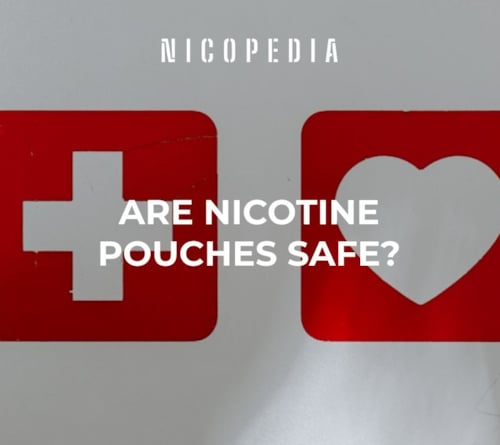Published 2020-06-25
Last update 2025-01-16
What is Snus?
Snus: a moist powdered oral smokeless tobacco product that is usually held in the mouth between the upper lip and gum. Snus or the smokeless tobacco pouch has always been culturally attached to Sweden. This is mainly because we were the first one's to produce it and bring it overseas when Swedes migrated to the US during the 1900s. However, snus is rapidly spreading further afield and is generating curiosity among Brits. But what really is snus? Read on to find out more about what snus really is, the types of snus, top brands and even the snus side effects!
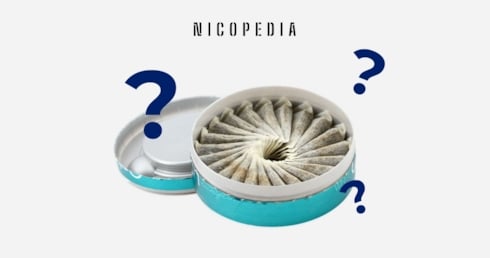
What is Snus Made Of? Types of Snus Swedish Snus vs American Snus Snus vs Other Nicotine and Tobacco Products Snus vs. Other Smokeless Tobacco Products Snus vs Tobacco-Free Nicotine Products Snus vs. Cigarettes The Best Snus Brands Top 4 Tobacco Snus Brands Top 5 Tobacco Free Snus (Nicotine Pouches) What is Snus Used For? Snus Side Effects Overview Snus Effects Timeline: What Does Snus Do For You? Snus Side Effects What Factors Change the Effects of Snus? Snus Effects on Eating or Drinking Snus Effects on Sports Performance
What is Snus Made Of?
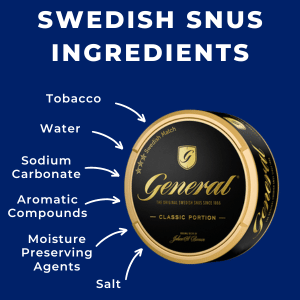
The main ingredient of snus products is, of course, ground tobacco, but there are other core ingredients, including:
- Water.
- Cooking salt.
- Sodium carbonate.
- Aromatic compounds (often bergamot or juniper).
- Moisture preserving agents.
Snus is considered a smokeless tobacco product made with ground tobacco leaves. It has become increasingly popular with smokeless tobacco users thanks to the convenience of the pouched product - making it less messy than traditional smokeless tobacco products like chewing tobacco and dip tobacco.
Types of Snus
Snus comes in two main varieties - loose and portioned.
Loose Snus
Loose snus is a moist powder that can be made into portions and packed using your fingers to make a pouch shape. It is quite a messy way to use snus and can result in dripping, but is the original way to use snus. Unlike other loose smokeless tobacco products, like chewing tobacco, loose snus has a high moisture content.
Portioned Snus
Portioned snus is where the moist snus powder comes pre-packaged in sachets for a less messy experience. It is considered more convenient and discreet than traditional snus (which is why the most popular type of Swedish snus). There are several forms of portioned snus:
- Original Portion: A product where the moist tobacco mixture has been placed in a small bag. Most popular brands of original portion snus are Kapten, Thunder, Skruf, Odens and Grov snus.
- White Portion: A dry and less runny tobacco pouch. The most popular brands that have white portion snus are General White, Lundgrens, Göteborgs Rapé, Siberia and Knox Portion.
- Mini Portion: An extra small pouch for discreet use.
- Slim Portion: A slim version for a more discreet look and better fit under the lip.
Swedish Snus vs American Snus
The main differences between Swedish snus and American snus are the portion size and flavours available.
Swedish snus traditionally has much larger portions than American snus, which also means they tend to have a higher nicotine content. It is also common for Swedish snus to taste less sweet than American snus, as US snus users tend to prefer to mask the tobacco flavour.
Snus vs Other Nicotine and Tobacco Products
When comparing snus to other nicotine products, it’s clear that each option carries its own risks. While snus might be perceived as a less harmful alternative to smoking and some smokeless products, it still contains tobacco and poses health risks. For individuals looking for a tobacco-free option, nicotine pouches may be a viable choice, but it's essential to remember that all nicotine products come with potential side effects.
Snus vs. Other Smokeless Tobacco Products
Snus is often compared to traditional smokeless tobacco products like chewing tobacco, dip, or snuff due to its similar nicotine delivery method.
- Chewing Tobacco: Users chew the tobacco to release nicotine, while snus is placed under the lip, allowing nicotine to be absorbed through the gum lining. Chewing tobacco generally produces more saliva, which requires spitting, whereas snus is more discreet and doesn't typically require spitting.
- Dip (Moist Snuff): Dip is also a moist tobacco product placed between the lower lip and gum, but it often produces more saliva than snus, requiring spitting. Snus tends to be less messy, making it more convenient for daily use.
- Snuff (Dry Tobacco): Snuff is a powdered tobacco that users inhale through the nose, while snus is used orally. The main difference lies in the method of use, with snus being less intrusive for people who prefer not to inhale tobacco products.
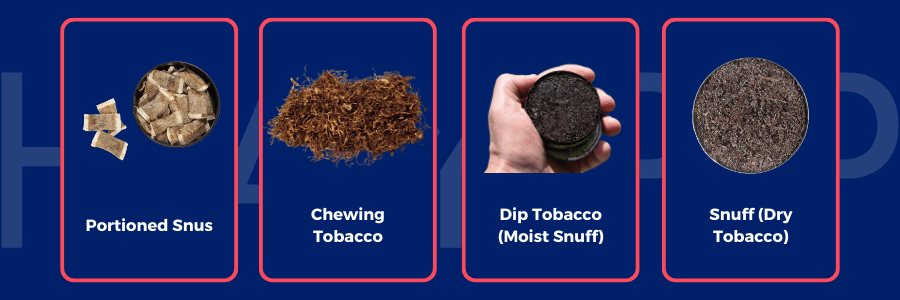
Snus is often compared to traditional smokeless tobacco products like chewing tobacco, dip, or snuff due to its similar nicotine delivery method.
- Chewing Tobacco: Users chew the tobacco to release nicotine, while snus is placed under the lip, allowing nicotine to be absorbed through the gum lining. Chewing tobacco generally produces more saliva, which requires spitting, whereas snus is more discreet and doesn't typically require spitting.
- Dip (Moist Snuff): Dip is also a moist tobacco product placed between the lower lip and gum, but it often produces more saliva than snus, requiring spitting. Snus tends to be less messy, making it more convenient for daily use.
- Snuff (Dry Tobacco): Snuff is a powdered tobacco that users inhale through the nose, while snus is used orally. The main difference lies in the method of use, with snus being less intrusive for people who prefer not to inhale tobacco products.
Snus vs Tobacco-Free Nicotine Products
Both snus and nicotine pouches are portioned oral nicotine products, so what is the difference between snus and nicotine pouches? The major difference between snus and pouches is that nicotine pouches are tobacco-free, whereas Swedish snus is not.
Tobacco is the base ingredient in most types of snus, however in nicotine pouches the nicotine is either produced synthetically or extracted from the Nicotiana tabacum plant and crystallised into nicotine salt (making it tobacco leaf free, as there is no tobacco plant in nicotine pouches).
It is also important to note that snus is illegal in the UK - however, nicotine pouches are legal (if you are over 18 years old).
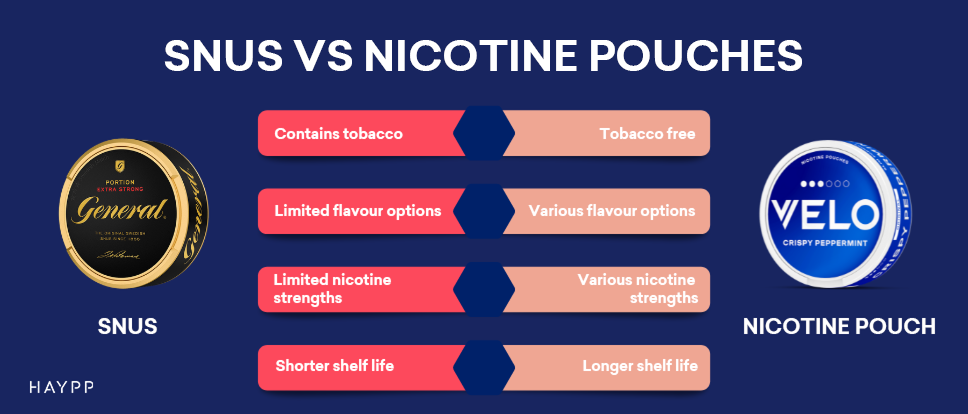
Snus vs. Cigarettes
Both snus and cigarettes deliver nicotine, but the method of delivery and health implications vary.
- Nicotine Delivery: Cigarettes deliver nicotine through inhalation, resulting in rapid absorption into the bloodstream. Snus, on the other hand, is absorbed more gradually through the mouth, leading to a slower release of nicotine over time. This results in different nicotine experiences, with snus having a longer but less immediate effect.
- Health Risks: Smoking cigarettes is known to cause severe health issues, including lung cancer, heart disease, and respiratory problems due to the combustion of tobacco. Snus avoids these risks by not involving combustion, but it still carries risks such as gum disease, oral cancer, and nicotine addiction. While snus may reduce the risk of smoking-related diseases, it is not risk-free.
The Best Snus Brands
Top 4 Tobacco Snus Brands
Based on data from one of the most popular retailers of Swedish and Scandinavian snus in Sweden, Nettotobak, the top 4 Swedish snus brands are:
- Ettan - Ettan has been produced for hundreds of years and remains the most popular snus in Sweden. Most Scandinavian snus sold in Sweden are Ettan (1/5th in fact).
- General - General snus was founded in 1840 and is made with a signature blend of over 20 types of tobacco, and is infused with bergamot oil (for the classic Swedish snus flavour)
- Göteborgs Rape - This brand has been sold in Sweden since 1919 and is a classic snus infused with juniper berries for a lightly sweet tobacco pouch experience.
- Lundgrens - Lundgrens snus is produced by Fiedler and Lundgren: another of the classic Swedish snus brands. While they experiment with new concepts, they still use traditional methods to craft their snus.
Want to learn more about Swedish snus brands? Check out the full list of all Swedish snus brands.
Top 5 Tobacco Free Snus (Nicotine Pouches)
While you cannot buy traditional snus in the UK due to tight tobacco control, you can still buy nicotine pouches (or tobacco-free snus) - which is a great alternative. The top 5 best snus brands in the UK that are tobacco-free are:
- Nordic Spirit - Nordic Spirit has one of the most unique flavour ranges in the nicotine pouch market. However, what makes them unique is that all Nordic Spirit pouches have a base note of bergamot added to them, giving snus users a flavour profile similar to that of traditional snus.
- VELO - A Swedish brand of pouches, VELO pouches are made from plant-based fibres, flavouring and nicotine with a gum base.
- LYFT - LYFT is a relaunched brand with a range of artisan pouches, providing snus users with a greater choice of snus products.
- ZYN - A brand of all-white Scandinavian snus. ZYN is the most popular nicotine pouch brand in the U.S. and are becoming increasingly popular with U.K. users too.
- LOOP - LOOP is a Swedish brand of pouches launched in 2019, developing new and innovative nicotine pouches
What is Snus Used For?
When people buy snus, why they are using it will vary from person to person. Some users see it as a smoke-free nicotine product for adults who are looking for a smoke-free alternative to smoking, vaping, chewing, dipping, and dissolvable and snuff tobacco products. However, there are many motivations behind choosing snus.
Snus, including tobacco-free snus, has a stimulating effect due to the nicotine which can lead to increased alertness, a sense of relaxation and even a temporary boost in mood. The body absorbs the nicotine through the lining of the mouth, and once it is absorbed you can start to notice some of the snus side effects. Some of the snus effects can include an increased heart rate, increased blood pressure, and the release of dopamine in the brain.
Snus Side Effects Overview
The snus effects start to occur as soon as the ingredients, mainly the nicotine, in the snus are activated by your saliva. The buccal mucosa (lining of your mouth) absorbs the "free" nicotine from the pouch - this is nicotine that is not connected to any other molecule. As a standard rule of thumb, there is more “free” nicotine when the pH of a pouch is higher. This oral absorption process allows nicotine to travel through your bloodstream, reaching your brain. Users also feel happy and calm when using snus, as nicotine stimulates the body to release dopamine, the body's "feel-good" neurotransmitter, and adrenaline gives the feeling of energy.
Regardless of the flavour or strength of the snus you buy, a snus user will feel the snus effects shortly after placing it under the lip. After that, how long does the snus last? The sensation can last between 20 minutes and an hour, after which you take out the snus.
Regardless of the flavour or strength of the snus you buy, a snus user will feel the snus effects shortly after placing it under the lip. After that, how long does the snus last? The sensation can last between 20 minutes and an hour, after which you take out the snus.
Regardless of the flavour or strength of snus you buy, snus users will feel the snus effects shortly after placing it under the lip, which can last between 20 minutes and an hour, after which you take out the snus.
Snus Effects Timeline: What Does Snus Do For You?

The effects of nicotine or snus pouches can vary based on factors like weight, metabolism, and how you use the snus. However, here's a general timeline of the snus effects:
- Immediate –10 minutes: The nicotine is absorbed through the mouth's mucous membrane, leading to increased heart rate and blood pressure.
- 10–20 minutes: The nicotine reaches the brain, triggering the release of neurotransmitters like dopamine for pleasure and relaxation.
- 30–40 minutes: Nicotine levels peak in the bloodstream, influenced by individual metabolism and pouch strength.
- 2–3 hours: Nicotine's half-life is around two hours, resulting in decreased concentration and potential cravings or withdrawal symptoms.
- 8–10 hours: Most nicotine and its by-products are eliminated through the kidneys. However, regular users may experience prolonged clearance times.
Snus Side Effects
Nicotine products, such as snus, can have various side effects due to their stimulating properties and addictive nature:
- Addiction: Snus contains nicotine, an addictive substance.
- Increased heart rate and blood pressure: Nicotine stimulates adrenaline release, leading to elevated heart rate, constricted blood vessels, and higher blood pressure (a common risk factor for heart disease).
- Gastrointestinal problems: Some individuals may experience upset stomach, heartburn, or nausea, particularly when starting or using high-nicotine snus products.
- Oral health issues: Regular snus use can contribute to gum recession, tooth discolouration (if it contains tobacco), and, in some cases, oral lesions due to direct contact with the gums and teeth.
- Insomnia and sleep disturbances: Nicotine is a stimulant that can interfere with sleep, causing difficulties falling asleep or insomnia.
- Decreased appetite: Nicotine can suppress appetite, but relying on tobacco products for weight control is not a healthy or sustainable approach.
- Withdrawal symptoms: If you're attempting to quit or reduce snus usage, you may experience withdrawal symptoms such as irritability, anxiety, depression, restlessness, and difficulty concentrating.
However, research also suggests some potential positive effects of nicotine, including improved attention and focus, reduced body weight and appetite, increased metabolic rate, and potential benefits for psychiatric illnesses and dementia-related conditions (which you can learn more about in our Snus Effects guide).
What Factors Change the Effects of Snus?
While we have covered the basics of snus effects, how do snus effects change when other factors come in? We look at some of the most asked questions, such as how snus effects change when you eat and drink and how snus effects sports performance.
Snus Effects on Eating or Drinking
While some snus consumers eat and drink while using snus, it is more common to remove snus before eating. Regardless of whether you eat and drink while using snus, do not swallow snus. Instead, dispose of it like gum (back into the packaging or into the bin), and remember to keep snus products out of the reach of children.
Snus Effects on Sports Performance
An estimated 1 in 4 athletes are now using oral nicotine products. The question of snus use in sports remains a topic of discussion, with organisations like the FA (Football Association) warning players about the dangers of drug use while monitoring the World Anti-Doping Agency's (WADA) stance.
In a 2015 report titled "Effects of Snus Administration on Sport Performance", the WADA clearly states nicotine is not prohibited in competition and does not provide unfair advantages in terms of performance. Although nicotine remains on their monitoring list in 2024, there is currently no ban against it.
To investigate the potential impact of snus on stamina and determine whether it should be banned in sporting competitions, the WADA conducted a three-year study involving 18 participants. The study included evaluations of overall fitness, the effects of snus during exercise ranging from 80% exertion to total exhaustion, and the impact during high-intensity short-interval exercises.
The results indicated that the test subjects experienced a 13.1% decrease in performance when exercising without snus, highlighting the significance of maintaining a regular nicotine level for individual performance. However, a different outcome was shown in research involving archery athletes. Nicotine supplementation enhanced cognitive function in the archers and stimulated the sympathetic adrenergic system (part of the nervous system), significantly improving archery scores.
Whether people use nicotine in sports or not, it is important to note that it can potentially impact performance, positively and/or negatively.
What is Snus? Frequently Asked Questions
Can I Buy Snus in the UK?
You can buy tobacco-free snus (also known as nicotine pouches) in the UK. However, you cannot buy tobacco snus in the UK - this also applies to most countries in the European Union.
How Does Snus Work?
Snus works orally with the nicotine being absorbed via the lining of your mouth and into the bloodstream. Snus is placed under the upper lip, where it rests against the gum, where the nicotine and other substances in the snus are absorbed through the lining of the mouth (oral mucosa), allowing them to enter the bloodstream directly.
How Long Does Snus Last?
On average, one pouch will last a snus user around 30 minutes, but personal use of snus can vary.
How Much Nicotine is in a Snus Pouch?
The nicotine content varies depending on the brand and type, but typically ranges from 4 mg to 20 mg per pouch, and contains no more nicotine than what tobacco smokers are used to.
Is Snus a Drug?
No, snus is not classified as a drug. People may think that snus is a drug due to its nicotine content. Nicotine acts on the brain's reward system, leading to feelings of pleasure and can even result in feelings of dependency. It's also important to note that snus is legally marketed as a tobacco product in many European Union countries, including Sweden, where it is widely used.
While snus contains nicotine and can be addictive, it is not classified as a drug in the traditional sense but rather as a tobacco product (but is not legal in the European Union, apart from in Sweden). The same goes for tobacco-free snus.
Related articles



